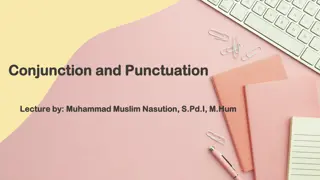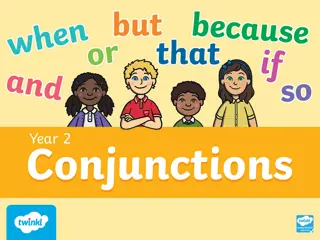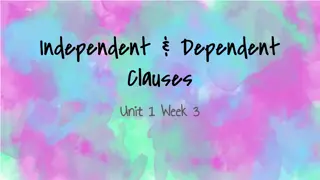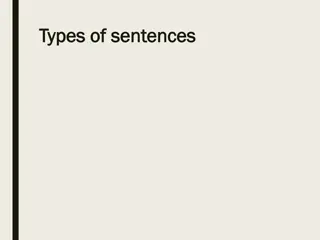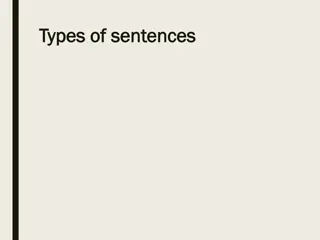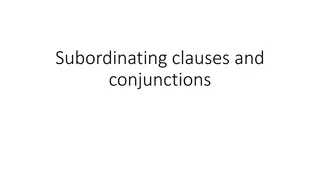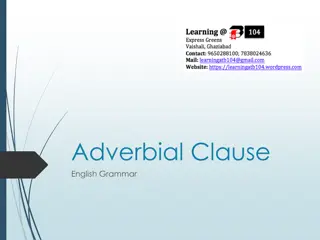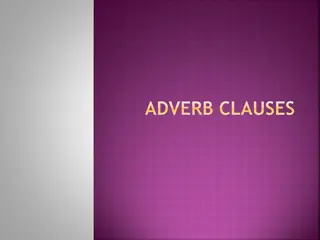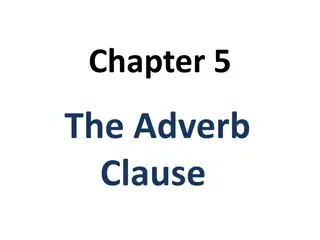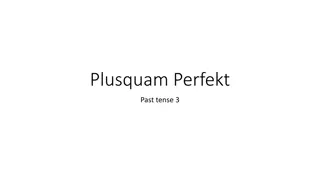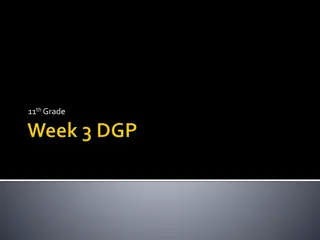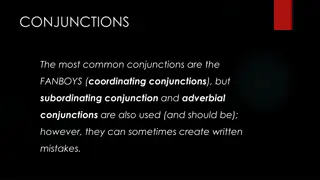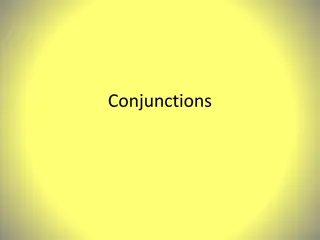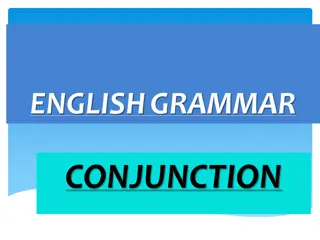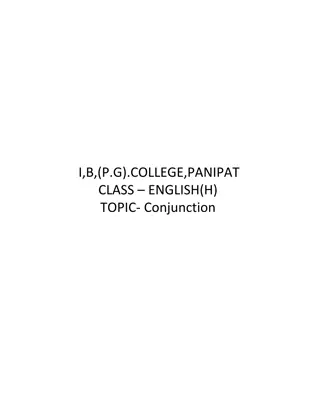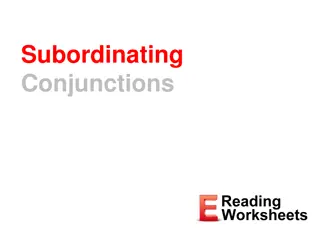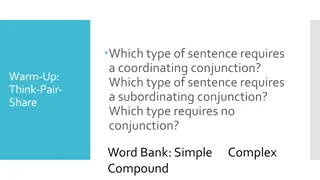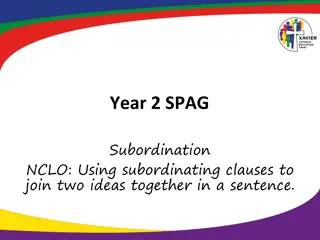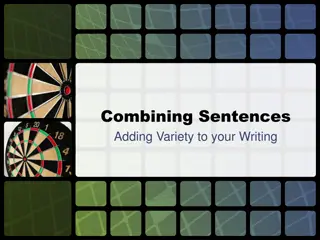Understanding Conjunctions and Punctuation in Grammar
Explore the world of conjunctions in grammar through this insightful lecture by Muhammad Muslim Nasution, covering types like coordinating, subordinating, and correlative conjunctions. Learn how conjunctions connect elements in sentences and practice creating sentences using conjunctions.
4 views • 9 slides
Understanding Different Types of Conjunctions and Their Usage
Conjunctions play a crucial role in linking words, phrases, and clauses in a sentence. This content explains the two main types of conjunctions – coordinating and subordinating, with a focus on examples using 'and, but, or, when, that, if, and because.' Each conjunction is illustrated with sample
5 views • 10 slides
Understanding Independent and Dependent Clauses
An independent clause contains a subject and a verb, forming a complete sentence on its own, while a dependent clause also has a subject and a verb but cannot stand alone. Dependent clauses rely on independent clauses to form complete sentences and are introduced by subordinating conjunctions. When
0 views • 4 slides
Understanding Types of Sentences and Their Structure
Uncover the different types of sentences - simple, compound, and complex - along with their distinct features and examples. Dive into the world of sentence structures, subordinating conjunctions, and sentence sequencing connectives for a comprehensive understanding of sentence construction.
0 views • 25 slides
Understanding Different Types of Sentences and Their Structure
Explore the world of simple, compound, and complex sentences with examples and explanations. Learn about the roles of subjects, predicates, main clauses, and subordinate clauses. Discover common subordinating conjunctions and how they connect ideas in sentences.
2 views • 25 slides
Understanding Subordinating Clauses and Conjunctions through Examples
Explore the concept of subordinating clauses and conjunctions by analyzing sentences with conjunctions like "when", "after", "if", "once", and more. The examples showcase how these clauses connect dependent and independent clauses to enhance sentence structure and meaning. Gain insights on using sub
0 views • 6 slides
Understanding Adverbial Clauses in English Grammar
Adverbial clauses in English grammar serve as adverbs to modify verbs, providing information about time, place, cause, contrast, condition, purpose, result, and manner. By exploring the types of adverb clauses, subordinating conjunctions, and examples, you can enhance your understanding of how adver
0 views • 10 slides
Understanding Adverb Clauses: Usage and Examples
Adverb clauses help to establish relationships between ideas by indicating time, cause and effect, contrast, and condition. They are dependent clauses that must be connected to a main clause. Punctuation plays a key role in distinguishing between adverb clauses that precede or follow a main clause.
0 views • 43 slides
Understanding Adverb Clauses: Types and Examples
Adverb clauses are dependent clauses that function as adverbs to modify the main clause's verb. They are connected by subordinating conjunctions and come in types like time, condition, cause, effect, and contrast. Adverb clauses of time detail when actions occur, while examples showcase how they mod
5 views • 7 slides
Understanding Plusquamperfekt Tense in German Grammar
The Plusquamperfekt tense in German is used to refer to actions that happened before another event in the past. This tense requires the past participles of haben and sein, such as hatte, war. Subordinating conjunctions like als, bevor, nachdem are used to establish a timeline of events. Conjunctions
3 views • 4 slides
Understanding Grammar Concepts Through Childhood Memories
Explore various grammar concepts such as subordinating conjunctions, dependent clauses, and appositives through nostalgic childhood memories of singing "The Wheels on the Bus." The content covers examples and explanations on different sentence structures, identifying parts of speech, and understandi
1 views • 11 slides
Mastering Conjunctions in Writing: Tips and Examples
Learn about the different types of conjunctions - coordinating, subordinating, and adverbial conjunctions - along with helpful writing tips and examples for using them correctly in sentences. Understand common mistakes to avoid and enhance the flow and clarity of your writing with conjunction usage.
0 views • 23 slides
Understanding Conjunctions and Their Functions
Learn about conjunctions, including how they link words, phrases, and clauses together. Discover the different types of conjunctions, such as coordinating and subordinating conjunctions, and understand their roles in connecting various elements of a sentence. Explore examples and grasp the importanc
0 views • 17 slides
Understanding Conjunctions: Types, Examples, and Basic Rules
Conjunctions are words that connect clauses, phrases, or sentences. They are essential for forming coherent and complex sentences. This article explores the definition, types, words for conjunctions, examples, and basic rules for using coordinating and subordinating conjunctions.
0 views • 9 slides
Understanding Conjunctions in English Grammar
Conjunctions are joining words that connect two or more words or sentences. They come in different types such as coordinating, correlative, and subordinating conjunctions, each serving a unique function in sentence structure. Practice exercises help reinforce learning and usage of conjunctions.
0 views • 20 slides
Understanding Conjunctions: A Comprehensive Guide
Conjunctions play a crucial role in language by joining words and phrases together to form complex sentences. This guide covers the basics of conjunctions, including types, functions, examples, and usage rules for coordinating and subordinating conjunctions. Explore the world of conjunctions through
0 views • 9 slides
Understanding Subordinating Conjunctions for Complex Sentences
Subordinating conjunctions are essential for joining clauses and creating complex sentences. They play a crucial role in showing relationships between ideas and enhancing the overall coherence of writing. This guide includes examples, commonly used subordinating conjunctions, and tips on identifying
0 views • 9 slides
Major Subclasses of Conjunctions and their Functions
There are two major subclasses of conjunctions: Coordinating Conjunctions and Subordinating Conjunctions. English coordinating conjunctions have different uses such as consequence, chronological sequence, contrast, concession, condition, and addition. These conjunctions play a vital role in connecti
1 views • 35 slides
AP World History Writing Workshop - Comparative Essay Guidelines
Learn how to write a successful comparative essay in the AP World History exam. Understand the scoring guidelines, crafting an acceptable thesis, and using subordinating conjunctions effectively in your thesis statement.
2 views • 12 slides
Understanding Types of Sentences - Simple, Compound, Complex
Explore the different types of sentences - simple, compound, and complex. Learn about coordinating and subordinating conjunctions that play key roles in forming these sentences. Understand how to identify and construct each sentence type. Dive into the world of sentence structures and enhance your g
0 views • 18 slides
Understanding Structurally Sentences: Simple, Compound, and Complex
Learn about structurally sentences - simple, compound, and complex. Understand the different sentence types, learn to make sentences using these structures, and explore the use of coordinating and subordinating conjunctions. Enhance your skills in changing sentence structures and grasp the essence o
0 views • 19 slides
Understanding Subordination in Sentence Structure
Subordination in writing involves joining two ideas in a sentence using subordinating clauses like when, if, that, or because. This technique emphasizes one idea over the other by giving less attention to the subordinate clause. Learn how to use subordination effectively with examples and practice s
0 views • 9 slides
Enhancing Writing with Sentence Combination Techniques
Explore the art of combining sentences to add variety and engage readers effectively. Learn about coordinating, subordinating, and correlative conjunctions, as well as conjunctive adverbs. Discover how combining sentences can prevent monotony, captivate your audience, and elevate the overall quality
0 views • 49 slides
Understanding Complex Sentences: Clauses, Conjunctions, and Punctuation
A complex sentence comprises an independent clause that can stand alone and a dependent clause that relies on another clause. Learn about independent and dependent clauses, subordinating conjunctions, and proper punctuation with examples. Discover the role of relative pronouns in forming complex sen
0 views • 10 slides
